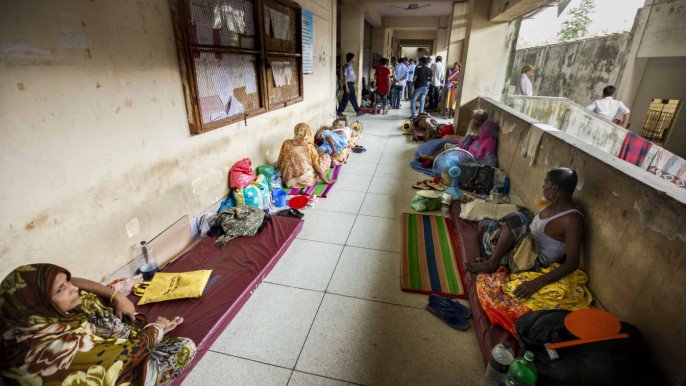
Healthcare spending pushed 6.3 million people below the poverty line in 2022, as estimated by the Bangladesh Institute of Development Studies (BIDS). 61% of hospitalised patients were in financial trauma.
Many not only sell their property, jewellery, and other assets but also take high-interest loans to cover their hospital expenses.
Health Insurance is the ultimate solution to mitigate these risks. Unfortunately, Bangladesh lags behind its neighbouring countries in terms of health insurance coverage.
There are many challenges for Health Insurance in Bangladesh.
To begin with, awareness about health risk management is very poor among Bangladeshi citizens. A majority of them who do private service to make their ends meet expect Health Insurance coverage from their employers. Whereas, they are not inclined to take Health Insurance on their own.
Endowment policies with maturity benefits are very popular, and insurers actively promote them. Since health insurance is a term policy without maturity benefits, many people aren’t interested in it.
Unlike developed countries, there is no mandatory health insurance coverage policy for Bangladeshi citizens.
Few employers in Bangladesh offer health insurance to their employees. Moreover, comprehensive health insurance policies are limited. Most life insurers offer it only as a supplementary benefit, which doesn’t cover hospital expenses adequately. There is also no standalone health insurance policy or dedicated health insurance company in the country.
Not only insurance regulators but also stakeholders are not advertising for Health Insurance properly. Except for a few, most insurers have no promotional activity.
Bancassurance has started lately. Surprisingly, however, many banks are not much intrigued to sell Health Insurance to their clients. Few banks are promoting micro–Health Insurance policies, which are not up to the mark for their clients.
There is no central medical record-keeping system among hospitals. Moreover, there is no coordination between hospitals and insurers to exchange clients’ previous medical records.
Insurers do not preserve customers’ medical claims data properly. Consequently, determining the future premium of the same customer becomes difficult for different insurers. In addition, reinsurance premium calculation is also becoming tough.
Currently, insurers handle health claims with their in-house teams, but there is a shortage of skilled professionals. In developed countries, health claims are managed by TPA (Third Party Administrator). Unfortunately, TPA is not authorised in Bangladesh yet.
Insurance penetration in Bangladesh is poor, which accounts to only 0.5% of GDP. Life insurance penetration is even poorer— only 0.2%. Surprisingly, there are no statistics about Health Insurance. Some fresh Health Insurance policies will lead to rise in overall insurance penetration.
Out-of-pocket healthcare expenditure is quite high in Bangladesh, around 70%. Health Insurance could lower people’s medical expenditure. Consequently, the number of populations who went below the poverty line due to the burden of medical expenses will be lower.
Similar to developed nations, Health Insurance should be mandatory for Bangladeshi citizens. At first, in a few sectors, this could be implemented on a trial basis.
If such happens, healthcare expenses will be decreased, government subsidy and expense for the health sector will be reduced and overall insurance contribution to GDP will be increased.
In addition, by introducing TPA, more employment opportunities can be created, and skilled professionals could be developed.
Health insurance in Bangladesh could be popularised in several ways. Both government and private insurers should launch different Health Insurance plans with attractive features. Both insurance regulators and stakeholders should promote the benefits of Health Insurance vigorously in Newspapers, TV, Radio, Social Media, Billboard and all mediums.
As Bancassurance is a new crucial channel, all banks should promote Health Insurance. If all the bank customers are brought under Health Insurance, then their business risk will be minimised.
Health Insurance claims should be paid faster. In case of hospitalisation, cashless claims could be game changing. After paying claims, massive promotion regarding customer experience of getting claims needs to be done.
Tax rebate facility should be introduced for Health Insurance. Consequently, citizens will be more inclined towards Health Insurance. In India, for example, under section 80D, an individual can get a tax deduction of INR 25,000 per year. For senior citizens, this increases to INR 50,000.
All insurers claim information should be stored in one central server. From this, stakeholders might access information pertaining to customers’ previous medical history.
Recently, in India, a platform named National Health Claims Exchange (NHCX) has been created by the government. All the stakeholders of Health Insurance can access claims related information of policyholders smoothly through this platform.
Health Insurance has tremendous potential in Bangladesh. In fact, it’s high time we popularised it to ensure financial security and healthcare access for all.
 Weekly Bangla Mirror | Bangla Mirror, Bangladeshi news in UK, bangla mirror news
Weekly Bangla Mirror | Bangla Mirror, Bangladeshi news in UK, bangla mirror news







